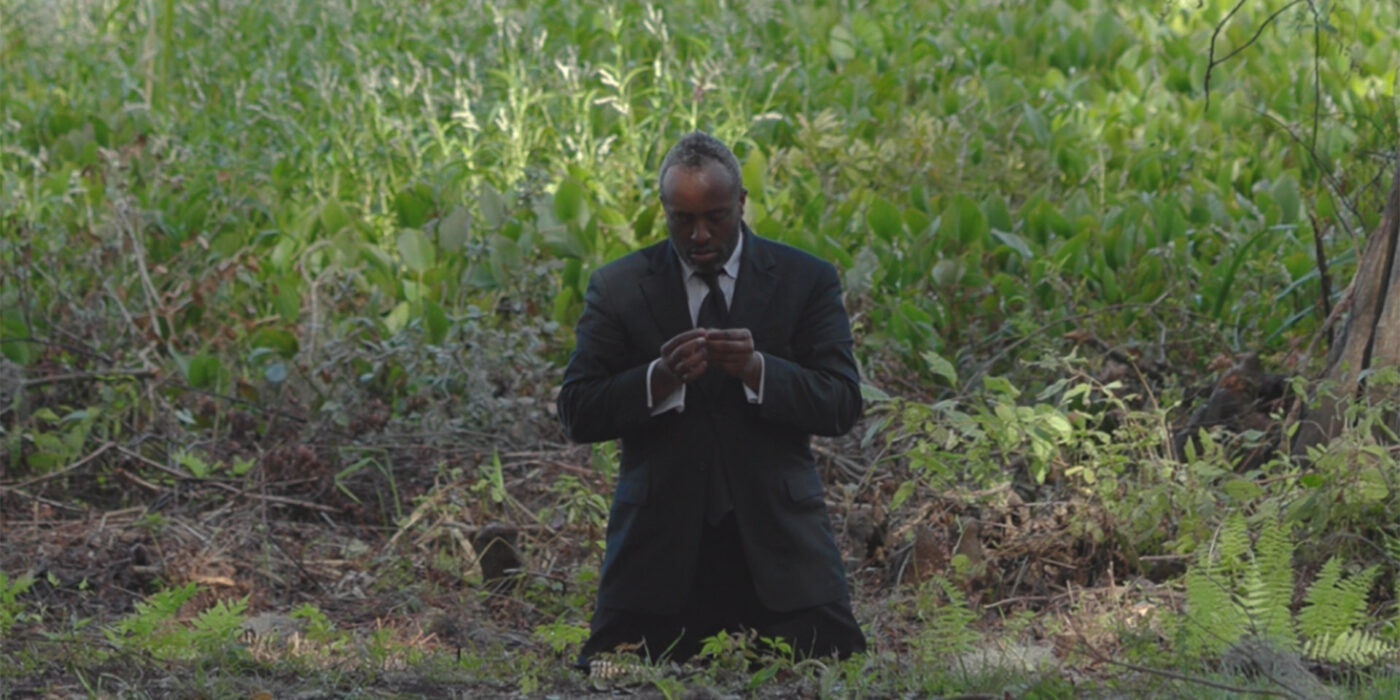Sheldon Scott. Photo courtesy of CONNERSMITH.
Sheldon Scott’s "Portrait, number 1 man" at Kemper Art Museum
2021-11-04 • Liam Otten

Sheldon Scott, still from Portrait, number 1 man (day clean ta sun down), 2018 (premiere 2019). Performance with rice and HD video, approx. 13 hrs. Photo: Collection of the artist, courtesy of CONNERSMITH. © Sheldon Scott.
No one knows how rice came to South Carolina. The plant is not native to the Americas. But records show that barrels of rice arrived in the port of Charles Town at least as early as 1672. By 1800, Carolina Golden Rice, derived from Madagascar seeds, was the state’s most important export.
This growth, and the wealth it brought, was due to the labor of enslaved people. Working in hot, dangerous conditions, they built massive hydrological systems and cleared thousands of acres of coastal swamp. They processed the resulting crops in winnowing barns—tall structures with perforated floors to filter rice grains while discarded hulls were taken by the wind.
In Portrait, number 1 man (day clean ta sun down), performance artist Sheldon Scott pays homage to his ancestors, enslaved people from the Gullah/Geechee region of the Southeastern United States, by embodying their toil. The piece consists of Scott, barefoot in a dark suit, kneeling on the floor as he hulls and winnows rice without break from dawn to dusk.
On Thursday and Friday, November 18 and 19, Scott will present Portrait, number 1 man at the Mildred Lane Kemper Art Museum at Washington University in St. Louis. The performance will begin at sunrise (approximately 6:45a CST) in the Museum’s Saligman Family Atrium, before the Museum has opened to the public. Visitors will be able to witness the performance during regular museum hours, between 11a and 5p. The performance will conclude at sunset (approximately 4:45p CST).
Scott was born and raised on South Carolina’s Pawleys Island, which, in the years before the Civil War, contained dozens of rice plantations and served as a summer retreat for plantation owners. He explained that, in using his own body to foreground the experiences of enslaved people, his intention is to “restore humanity to the narrative of slavery in the American South.”
“The meditative nature of this work gives the viewer time to contemplate race in this country, past, present and future,” Scott added, “a conversation we’ve come to understand demands America to use both its quick and slow muscles.”

A single grain of rice in Sheldon Scott’s hands. Photo courtesy of CONNERSMITH. © Sheldon Scott.
The Outwin
Scott’s performance is held in conjunction with The Outwin: American Portraiture Today, which remains on view at the Kemper Art Museum through January 23. Organized by the Smithsonian’s National Portrait Gallery, The Outwin highlights the work of 46 artists who use the genre of portraiture to explore current social and political contexts. A 13-hour video of Scott’s Portrait, number 1 man is included in the exhibition.
In addition to the performance, at 11a Saturday, November 20, Scott will discuss his work in an online artist talk with Gwendolyn DuBois Shaw, of the University of Pennsylvania’s Department of the History of Art, as part of the Kemper Art Museum’s “In Conversation” series.
The performance, exhibition, and artist talk are all free and open to the public, but registration is required for the talk; in addition, all Museum visitors must show proof of full COVID-19 vaccination or a negative COVID-19 test. For more information about campus COVID-19 policies, visit the WashU Together website. For more information about Museum programs, call 314-935-4523; visit kemperartmuseum.wustl.edu; or follow the museum on Facebook, Instagram, and Twitter.
About Sheldon Scott
Now living and working in Washington, D.C., Scott explores the intersection of race, sexuality, and economics—and critiques Black male stereotypes—through a wide-ranging fine art practice that encompasses performance, sculpture, and installation as well as photography, spoken word, creative nonfiction, and video.
Scott’s works have been presented at the National Portrait Gallery, the National Museum of Women in the Arts, Delaware State University, Art Miami, and the American University Art Museum, among others. His work is included in such collections as the National Museum of African-American History and Culture and the Ogden Museum of Southern Art.
Scott has been a featured presenter at TEDx Mid-Atlantic, ArtTable, CreativeTime Festival, Washington Ideas Festival, and the Smithsonian Long Conversation. He currently serves on the boards of Teaching for Change, the Smithsonian Anacostia Community Museum, Transformer, and Woolly Mammoth Theatre, and serves at the global head of purpose at Eaton Workshop. Scott is represented by CONNERSMITH gallery and Ross Yoon literary agency.
